Fruit fly research might change diabetes treatment
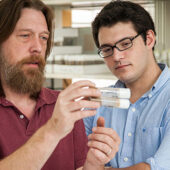 Erik Johnson’s latest study, which appears in the current issue of the Genetics, uses the fruit fly to look at enzyme signaling as a key to developing new treatments for diabetes and as an aid in all sorts of metabolic research, including weight-loss drugs.
Erik Johnson’s latest study, which appears in the current issue of the Genetics, uses the fruit fly to look at enzyme signaling as a key to developing new treatments for diabetes and as an aid in all sorts of metabolic research, including weight-loss drugs.
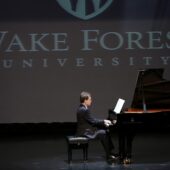 “We wanted to introduce Wake Forest to China as we look for opportunities to create educational programs in the future,” said Linda McKinnish Bridges, associate dean of admissions. “Not only opportunities for students from China to learn about Wake Forest, but opportunities for Wake Forest students to study abroad or find careers in China.”
“We wanted to introduce Wake Forest to China as we look for opportunities to create educational programs in the future,” said Linda McKinnish Bridges, associate dean of admissions. “Not only opportunities for students from China to learn about Wake Forest, but opportunities for Wake Forest students to study abroad or find careers in China.”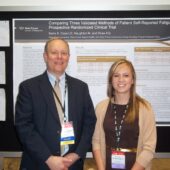 Presenting research to the largest gathering of cancer professionals in the world is an unusual opportunity for an undergraduate student. Junior Katherine Sams got to do it thanks to the mentor she met in her first-year seminar.
Presenting research to the largest gathering of cancer professionals in the world is an unusual opportunity for an undergraduate student. Junior Katherine Sams got to do it thanks to the mentor she met in her first-year seminar. In 2002, euro notes and coins began circulating in the European Community, and for the 10 years since, economists have asked if the monetary union was a good decision. One intensely debated question: What if the United Kingdom had adopted the euro? A student/faculty team answer the question.
In 2002, euro notes and coins began circulating in the European Community, and for the 10 years since, economists have asked if the monetary union was a good decision. One intensely debated question: What if the United Kingdom had adopted the euro? A student/faculty team answer the question. In an op-ed published in the Los Angeles Times, political science professor and genocide expert Sarah Lischer writes that "future concord depends on the stories we tell" about the 1995 massacre of more than 8,000 Bosnian Muslims in the town of Srebrenica.
In an op-ed published in the Los Angeles Times, political science professor and genocide expert Sarah Lischer writes that "future concord depends on the stories we tell" about the 1995 massacre of more than 8,000 Bosnian Muslims in the town of Srebrenica.
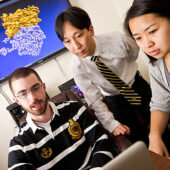 Anqi Zou (’12) never thought she would thank video gamers for showing her the way to exciting discoveries in molecular biology. But here she is, acknowledging that the technology she uses to show the inner workings of cells was originally perfected to create realistic images on gaming screens worldwide.
Anqi Zou (’12) never thought she would thank video gamers for showing her the way to exciting discoveries in molecular biology. But here she is, acknowledging that the technology she uses to show the inner workings of cells was originally perfected to create realistic images on gaming screens worldwide. A look at the top 10 Wake Forest science stories of the 2011-2012 academic year shows a broad range of topics, including thermoelectric fabric, birds in the Galapagos, exercise and diabetics, using video game technology to fight cancer, cyber security, e-textbooks, regenerative medicine and more.
A look at the top 10 Wake Forest science stories of the 2011-2012 academic year shows a broad range of topics, including thermoelectric fabric, birds in the Galapagos, exercise and diabetics, using video game technology to fight cancer, cyber security, e-textbooks, regenerative medicine and more.
 Christian Miller, associate professor of philosophy and director of The Character Project, explores the beliefs that help us act more virtuously for the re-launch of the high profile website developed by The John Templeton Foundation called Big Questions Online.
Christian Miller, associate professor of philosophy and director of The Character Project, explores the beliefs that help us act more virtuously for the re-launch of the high profile website developed by The John Templeton Foundation called Big Questions Online.
 The Wall Street Journal prominently featured Wake Forest for its national leadership in making personal and career development a mission-critical component of the college experience. The article, "Colleges Get Career-Minded", appeared the day after commencement.
The Wall Street Journal prominently featured Wake Forest for its national leadership in making personal and career development a mission-critical component of the college experience. The article, "Colleges Get Career-Minded", appeared the day after commencement. 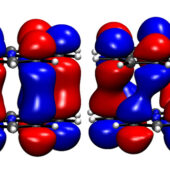 The secrets to making better cell phones, microchips, and batteries lie in the electronic structure of their materials. More than 150 physicists and chemists from around the world will gather June 5 to 8 to explore the science behind developing better materials.
The secrets to making better cell phones, microchips, and batteries lie in the electronic structure of their materials. More than 150 physicists and chemists from around the world will gather June 5 to 8 to explore the science behind developing better materials.